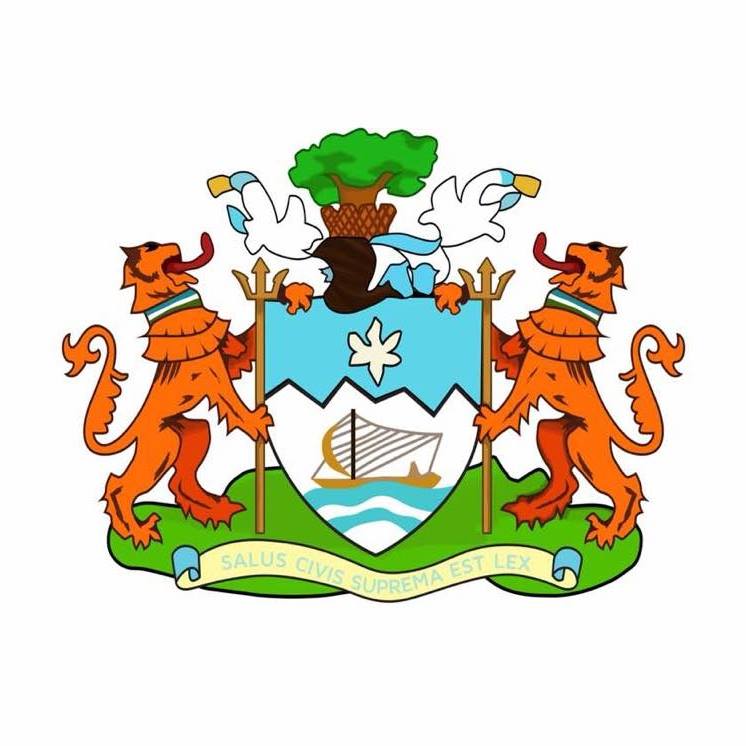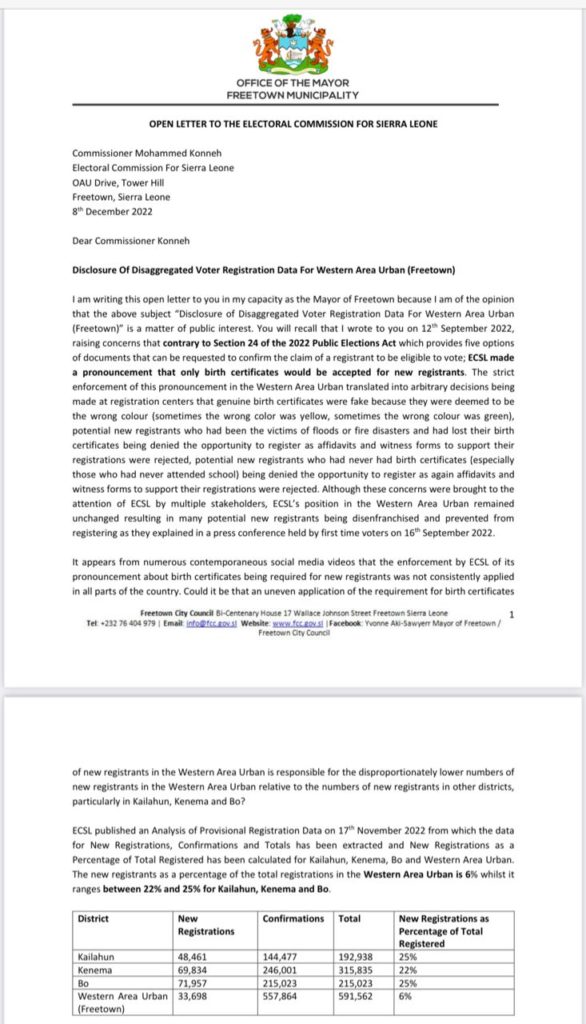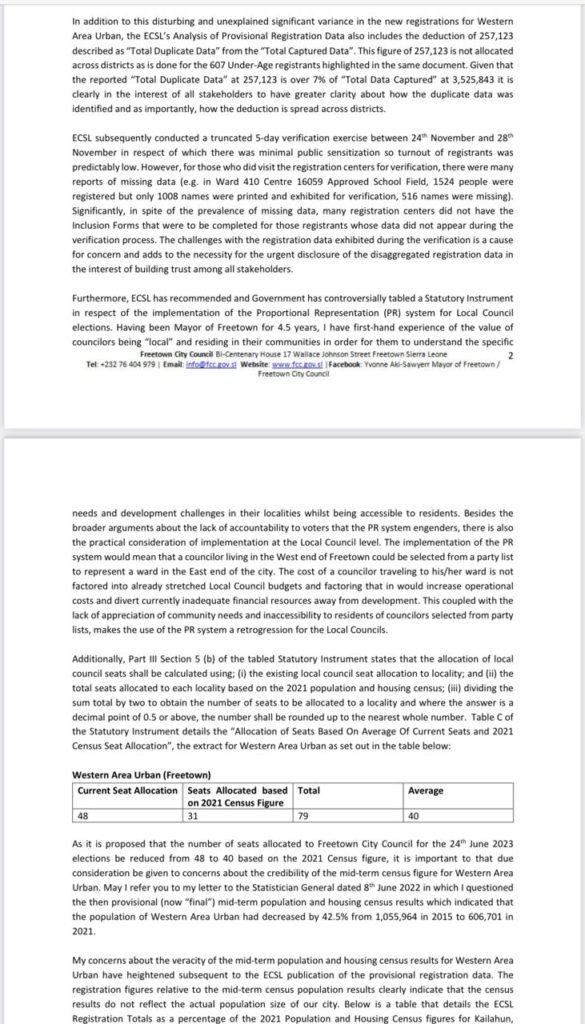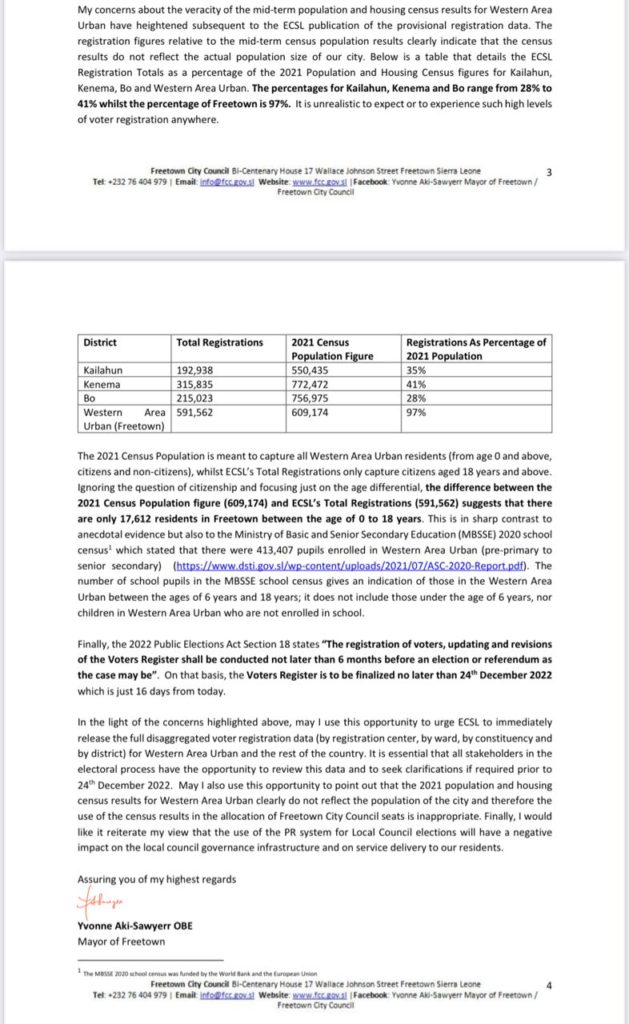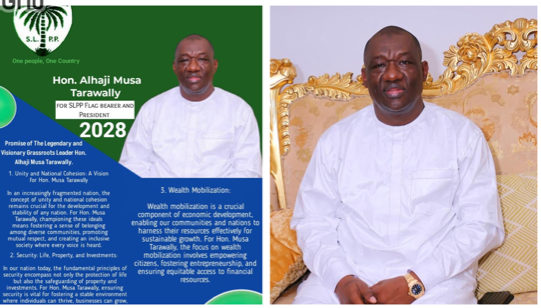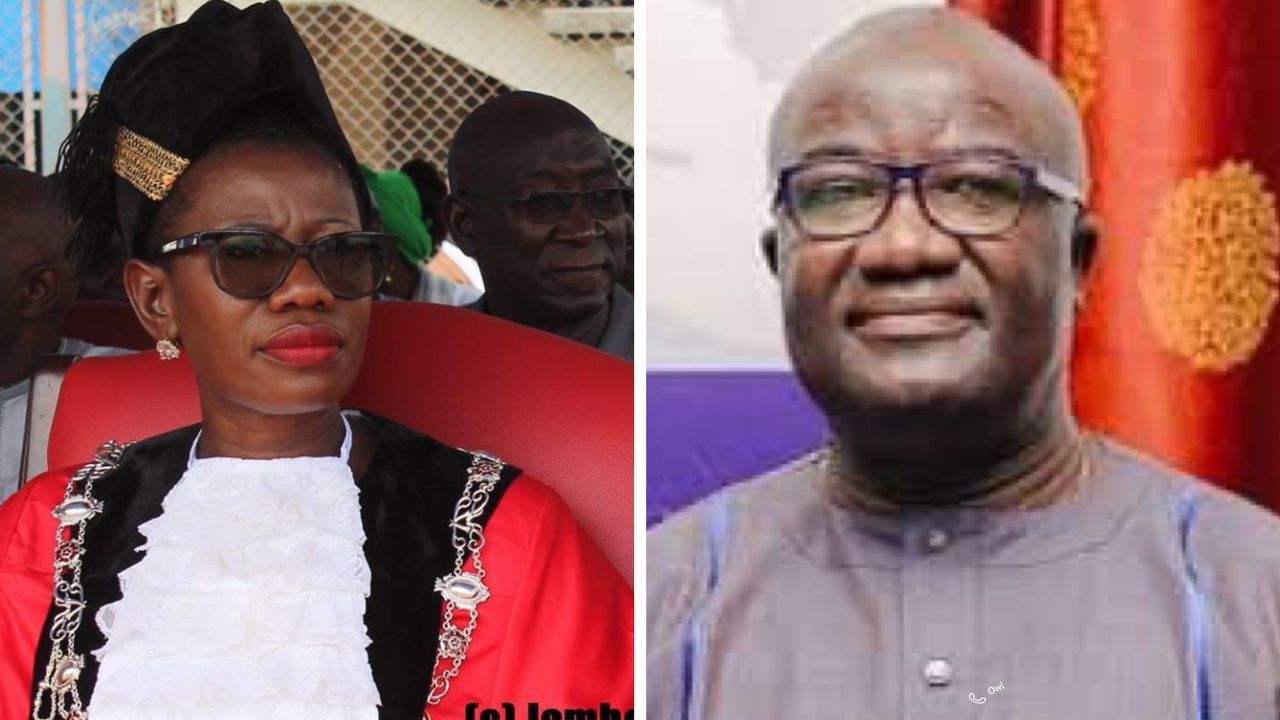
Mayor of Freetown, Yvonne Aki Sawyerr has written a strongly-worded letter to the Electoral Commissioner Mohamed Konneh, describing the Voter Registration exercise in the Western Urban Area of Freetown as anything other than transparent.
Taking into consideration the fact that Freetown is a cosmopolitan state where nearly all ethnic tribes reside, numerous accusations have been made that the Voter Registration was skewed.
With Freetown being the most congested city in Sierra Leone, with perpetual traffic, densely populated streets, markets, schools etc, political pundits and social commentators have found themselves agreeing with Mayor Yvonne Aki Sawyerr that indeed the Voter Registration which was conducted this year by the ECSL leaves much to be desired as it does not and cannot honestly reflect the actual population of especially the Western Urban Area of Freetown where people reported that their names were deleted from the Register and that they could not see their names.
See Mayor’s letter:
OPEN LETTER TO THE ELECTORAL COMMISSION FOR SIERRA LEONE
Commissioner Mohammed Konneh
Electoral Commission for Sierra Leone
OAU Drive, Tower Hill
Freetown, Sierra Leone
8th December 2022
Dear Commissioner Konneh
Disclosure of Disaggregated Voter Registration Data For Western Area Urban (Freetown)
I am writing this open letter to you in my capacity as the Mayor of Freetown because I am of the opinion that the above subject “Disclosure of Disaggregated Voter Registration Data For Western Area Urban (Freetown)” is a matter of public interest. You will recall that I wrote to you on 12th September 2022, raising concerns that contrary to Section 24 of the 2022 Public Elections Act which provides five options of documents that can be requested to confirm the claim of a registrant to be eligible to vote; ECSL made a pronouncement that only birth certificates would be accepted for new registrants. The strict enforcement of this pronouncement in the Western Area Urban translated into arbitrary decisions being made at registration centers that genuine birth certificates were fake because they were deemed to be the wrong color (sometimes the wrong color was yellow, sometimes the wrong color was green), potential new registrants who had been the victims of floods or fire disasters and had lost their birth certificates being denied the opportunity to register as affidavits and witness forms to support their registrations were rejected, potential new registrants who had never had birth certificates (especially those who had never attended school) being denied the opportunity to register as again affidavits and witness forms to support their registrations were rejected. Although these concerns were brought to the attention of ECSL by multiple stakeholders, ECSL’s position in the Western Area Urban remained unchanged resulting in many potential new registrants being disenfranchised and prevented from registering as they explained in a press conference held by first time voters on 16th September 2022.
It appears from numerous contemporaneous social media videos that the enforcement by ECSL of its pronouncement about birth certificates being required for new registrants was not consistently applied in all parts of the country. Could it be that an uneven application of the requirement for birth certificates of new registrants in the Western Area Urban is responsible for the disproportionately lower numbers of new registrants in the Western Area Urban relative to the numbers of new registrants in other districts, particularly in Kailahun, Kenema and Bo?
ECSL published an Analysis of Provisional Registration Data on 17th November 2022 from which the data for New Registrations, Confirmations and Totals has been extracted and New Registrations as a Percentage of Total Registered has been calculated for Kailahun, Kenema, Bo and Western Area Urban. The new registrants as a percentage of the total registrations in the Western Area Urban is 6% whilst it ranges between 22% and 25% for Kailahun, Kenema and Bo.
| District | New Registrations | Confirmations | Total | New Registrations as Percentage of Total Registered |
| Kailahun | 48,461 | 144,477 | 192,938 | 25% |
| Kenema | 69,834 | 246,001 | 315,835 | 22% |
| Bo | 71,957 | 215,023 | 215,023 | 25% |
| Western Area Urban (Freetown) | 33,698 | 557,864 | 591,562 | 6% |
In addition to this disturbing and unexplained significant variance in the new registrations for Western Area Urban, the ECSL’s Analysis of Provisional Registration Data also includes the deduction of 257,123 described as “Total Duplicate Data” from the “Total Captured Data”. This figure of 257,123 is not allocated across districts as is done for the 607 Under-Age registrants highlighted in the same document. Given that the reported “Total Duplicate Data” at 257,123 is over 7% of “Total Data Captured” at 3,525,843 it is clearly in the interest of all stakeholders to have greater clarity about how the duplicate data was identified and as importantly, how the deduction is spread across districts.
ECSL subsequently conducted a truncated 5-day verification exercise between 24th November and 28th November in respect of which there was minimal public sensitization so turnout of registrants was predictably low. However, for those who did visit the registration centers for verification, there were many reports of missing data (e.g. in Ward 410 Centre 16059 Approved School Field, 1524 people were registered but only 1008 names were printed and exhibited for verification, 516 names were missing). Significantly, in spite of the prevalence of missing data, many registration centers did not have the Inclusion Forms that were to be completed for those registrants whose data did not appear during the verification process. The challenges with the registration data exhibited during the verification is a cause for concern and adds to the necessity for the urgent disclosure of the disaggregated registration data in the interest of building trust among all stakeholders.
Furthermore, ECSL has recommended and Government has controversially tabled a Statutory Instrument in respect of the implementation of the Proportional Representation (PR) system for Local Council elections. Having been Mayor of Freetown for 4.5 years, I have first-hand experience of the value of councilors being “local” and residing in their communities in order for them to understand the specific needs and development challenges in their localities whilst being accessible to residents. Besides the broader arguments about the lack of accountability to voters that the PR system engenders, there is also the practical consideration of implementation at the Local Council level. The implementation of the PR system would mean that a councilor living in the West end of Freetown could be selected from a party list to represent a ward in the East end of the city. The cost of a councilor traveling to his/her ward is not factored into already stretched Local Council budgets and factoring that in would increase operational costs and divert currently inadequate financial resources away from development. This coupled with the lack of appreciation of community needs and inaccessibility to residents of councilors selected from party lists, makes the use of the PR system a retrogression for the Local Councils.
Additionally, Part III Section 5 (b) of the tabled Statutory Instrument states that the allocation of local council seats shall be calculated using; (i) the existing local council seat allocation to locality; and (ii) the total seats allocated to each locality based on the 2021 population and housing census; (iii) dividing the sum total by two to obtain the number of seats to be allocated to a locality and where the answer is a decimal point of 0.5 or above, the number shall be rounded up to the nearest whole number. Table C of the Statutory Instrument details the “Allocation of Seats Based on Average of Current Seats and 2021 Census Seat Allocation”, the extract for Western Area Urban as set out in the table below:
Western Area Urban (Freetown)
| Current Seat Allocation | Seats Allocated based on 2021 Census Figure | Total | Average |
| 48 | 31 | 79 | 40 |
As it is proposed that the number of seats allocated to Freetown City Council for the 24th June 2023 elections be reduced from 48 to 40 based on the 2021 Census figure, it is important to that due consideration be given to concerns about the credibility of the mid-term census figure for Western Area Urban. May I refer you to my letter to the Statistician General dated 8th June 2022 in which I questioned the then provisional (now “final”) mid-term population and housing census results which indicated that the population of Western Area Urban had decreased by 42.5% from 1,055,964 in 2015 to 606,701 in 2021.
My concerns about the veracity of the mid-term population and housing census results for Western Area Urban have heightened subsequent to the ECSL publication of the provisional registration data. The registration figures relative to the mid-term census population results clearly indicate that the census results do not reflect the actual population size of our city. Below is a table that details the ECSL Registration Totals as a percentage of the 2021 Population and Housing Census figures for Kailahun, Kenema, Bo and Western Area Urban. The percentages for Kailahun, Kenema and Bo range from 28% to 41% whilst the percentage of Freetown is 97%. It is unrealistic to expect or to experience such high levels of voter registration anywhere.
| District | Total Registrations | 2021 Census Population Figure | Registrations As Percentage of 2021 Population |
| Kailahun | 192,938 | 550,435 | 35% |
| Kenema | 315,835 | 772,472 | 41% |
| Bo | 215,023 | 756,975 | 28% |
| Western Area Urban (Freetown) | 591,562 | 609,174 | 97% |
The 2021 Census Population is meant to capture all Western Area Urban residents (from age 0 and above, citizens and non-citizens), whilst ECSL’s Total Registrations only capture citizens aged 18 years and above. Ignoring the question of citizenship and focusing just on the age differential, the difference between the 2021 Census Population figure (609,174) and ECSL’s Total Registrations (591,562) suggests that there are only 17,612 residents in Freetown between the age of 0 to 18 years. This is in sharp contrast to anecdotal evidence but also to the Ministry of Basic and Senior Secondary Education (MBSSE) 2020 school census[1] which stated that there were 413,407 pupils enrolled in Western Area Urban (pre-primary to senior secondary) (https://www.dsti.gov.sl/wp-content/uploads/2021/07/ASC-2020-Report.pdf). The number of school pupils in the MBSSE school census gives an indication of those in the Western Area Urban between the ages of 6 years and 18 years; it does not include those under the age of 6 years, nor children in Western Area Urban who are not enrolled in school.
Finally, the 2022 Public Elections Act Section 18 states “The registration of voters, updating and revisions of the Voters Register shall be conducted not later than 6 months before an election or referendum as the case may be”. On that basis, the Voters Register is to be finalized no later than 24th December 2022 which is just 16 days from today.
In the light of the concerns highlighted above, may I use this opportunity to urge ECSL to immediately release the full disaggregated voter registration data (by registration center, by ward, by constituency and by district) for Western Area Urban and the rest of the country. It is essential that all stakeholders in the electoral process have the opportunity to review this data and to seek clarifications if required prior to 24th December 2022. May I also use this opportunity to point out that the 2021 population and housing census results for Western Area Urban clearly do not reflect the population of the city and therefore the use of the census results in the allocation of Freetown City Council seats is inappropriate. Finally, I would like it reiterate my view that the use of the PR system for Local Council elections will have a negative impact on the local council governance infrastructure and on service delivery to our residents.
Assuring you of my highest regards
Yvonne Aki-Sawyerr OBE
Mayor of Freetown
[1] The MBSSE 2020 school census was funded by the World Bank and the European Union

